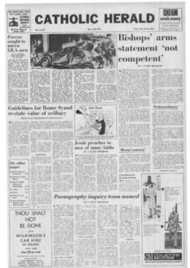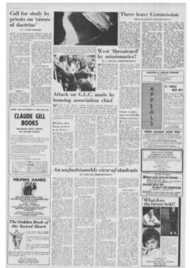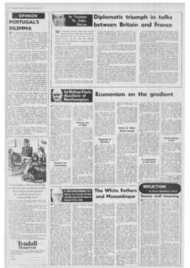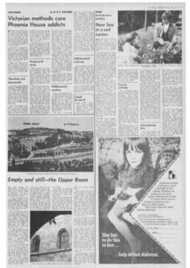Page 3, 28th May 1971
Page 3
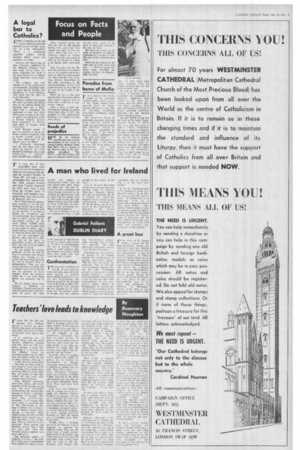
Report an error
Noticed an error on this page?If you've noticed an error in this article please click here to report it.
Tags
Share
Related articles
More About Irish Acting
Teaching Confused With 'learning' In Ireland
Hopeful Happenings, But More Signs Of Disunity
Drama Is Their Heartbeat :7
Irish Bishops Firm On Mixed Marriages
A man who lived for Ireland
Gabriel Fallon's DUBLIN DIARY
IT is every day of sixty event-filled years since one of my school companions, deep in conversation with me, told his younger brother to "buzz off" and seek a cornpanionship more suited to his age. That younger brother was Sean I.emass, separated by little more than a year from Ws brother Noel, so tragically and brutally murdered many years afterwards, in Ireland's civil war.
But if Noel died for Ireland, Sean survived to live for her, wearing himself out in the process. If he had a particular wish for his country, it was that it should be prosperous and forward-looking, that it should take its place among the industrialised nations of the earth. Arthur Griffith, from whom Sean was divided both in years and in politics. had a similar dream. Lemass fulfilled it. There are those whb will tell you that he over-tipped the balance, that Ireland is first, last. and all the time, an agricultural country. No doubt entry into the common market will decide this issue.
He was unlike the average politician, in that he had no time for recrimination. Namecalling was foreign to his nature. He never boasted about his role in Ireland's War of Independence. There was too much to be done, too little time in which to do it. In his day he was the recipient of many honours. When the occasion called for it he wore them lightly; but generally, not at all.
He was simply citizen Sean Lemass, a Dubliner of Dubliners, a family man, an inveterate pipe-smoker, fond of -a game of poker. He once
warned me against a distinguished actor, who, he said, played that game "from the cellar up." On one occasion, during a prolonged and rather boring ceremony in the Vatican, he automatically took his pipe from his pocket until his aide took it from him and slipped it back again. No doubt his mind, at the time, was teasing out some perplexing problem in Irish economics.
He was as anxious as any of his countrymen to see an end
to the partition of Ireland, but his was an anxiety that moved on the level of statesmanship. His visit to Terence O'Neill, taken at much political risk, has mapped out a policy which those who come after him would do well to follow,
Confrontation
THE Fine Gael Ard Fheis (or
A.G.M., if you wish) has come and gone, and with it the usual amount of political name-calling, made all too easy for this long-standing opposition group by the jittering state of the party in office. Mr. Liam Cosgrove T.D. summed up this situation in his statement that "the political events of the past year were without parallel in the history of the State."
One of the most interesting discussions to emerge from this meeting (held in Dublin's Mayorless Mansion House) was that on education. Mr. P. J. Lindsay S.C. urged the delegates not to engage in any confrontation "sponsored by the World Bank and its conscripts in the Department of
Education." Dr. Garret Fitzgerald (one of the brainiest members of the Party) swept
this "extraordinary theory" aside, declaring that if there was anybody who had sponsored community schools it was the Irish Hierarchy.
Fine Gael, lie said, could not be positive in its attitude towards the establishment of genuine commtlnily schools. "But that does not mean." he continued, "that we will support any phoney proposals that use the label 'community schools' to hide moses in quite another direction — towards excluding parents from playing a part in selecting their own representatives on the community school Board of Management; or towards taking away the ownership of the school property from religious orders or vocational education
committees but not transferring it to the local community."
In this Dr. Fitzgerald seems to be heading his party in a direction foreseen by the Rev. Dr. James Good who recently wrote: "Confrontation is an unpleasant word. It is particularly unpleasant when it takes place within a community. Unfortunately, it does not require the gift of prophecy to foresee that the agreement reached between the Department of Education and the Irish Catholic Hierarchy may well produce one of the most bitter and disastrous confrontations of this century."
A great loss
I N the death of Sir Tyrone 1Guthrie. Ireland and the English-speaking theatre has suffered a great loss. Ireland particularly, for it has lost that rare phenomenon, a man of sterling integrity. As Chancellor of Queens University he dropped a bomb which almost blew Belfast to pieces when he urged students to band together and abolish that "senseless line" which we call the Border. He had no time for borders between people. Though his work in the theatre took him to far away places he had a Goldsmith-like love of his home and neighbours at
Newhliss. • Co. Monaghan. Money meant little to him apart from what good he could do with it.
blog comments powered by Disqus


